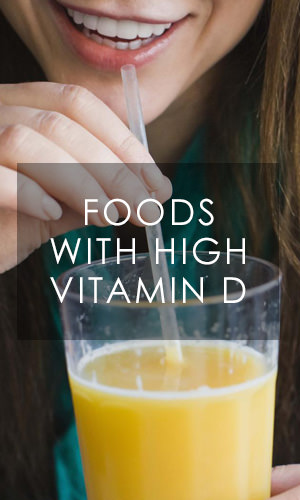
Foods With High Vitamin D

Posted on 10 Jul, 2022

Vitamin D is a bone-health supernutrient. Without sufficient amounts -- on average about 400 to 600 international units per day for adults -- you run the risk of bone fractures, osteoporosis and other problems, such as muscle weakness. This is largely because vitamin D helps your body maintain the appropriate calcium levels.
An estimated 1 billion people worldwide lack adequate vitamin D, according to the Harvard School of Public Health, and while your skin can synthesize vitamin D from sunlight, many Americans spend too little time in the sunny outdoors. The answer? Vitamin D-rich foods. Because they're often also nutritious in other ways, foods high in vitamin D can benefit not only your bones, but your overall wellness.

Salmon
While it's best known for protein and heart-healthy omega-3 fats, salmon is also one of the richest sources of vitamin D. A three-ounce serving provides 447 IU of vitamin D. Like other fish, salmon is also rich in essential minerals, including calcium. To meet your vitamin D needs and increase your overall nutrient intake, make salmon a dietary staple. Salmon truly is a superfood, ranking in most top ten list of nutritional powerhouses. Incorporate salmon into egg dishes for breakfast and serving it grilled with vegetables for dinner.
[Related:Farmed Salmon Is Healthier Than You Think]

Canned Tuna
In addition to being a versatile and common food in Americans’ kitchens, canned tuna provides significant amounts of vitamin D. Three ounces of water-packed canned tuna provides 154 IU of vitamin D. The edible bone particles contained in canned tuna are chock full of calcium and vitamin D, making it a bone health win-win. For a nutritious tuna salad, mix water-packed tuna with mayo, chopped celery, shredded carrots, and fresh or frozen peas. You can also stir canned tuna into pasta sauces and rice dishes in place of chicken or beef for a vitamin D-rich, low-fat alternative.
[Related: The 9 Safest Seafood Options]

Trout
Trout is a staple of the Mediterranean diet -- a dietary lifestyle that's been linked with improved heart health, low cholesterol and longevity. To reap such benefits, keep trout on your grocery list. According to the New York State Department of Health, a three-ounce portion of the fish provides 645 IU of vitamin D, although the amount of vitamin D can vary a lot depending on the species of trout and whether it's wild or farmed. Steelhead trout is considered especially high in vitamin D. Healthy preparation methods include baking, poaching and grilling using nonstick cooking spray or olive oil. For added flavor, dust trout with fresh or dried herbs and add a splash of lemon juice.
[Relative: Benefits of the Mediterranean Diet]

Fortified Orange Juice
If you're not a fish lover, fear not. A variety of foods and drinks are fortified with the nutrient, meaning that it's added during processing. Fortified orange juice is one of the richest examples, containing 137 IU of vitamin D per serving. Fortified orange juice also provides valuable amounts of calcium and the antioxidant vitamin C. Because even pure juices are high in sugars, pair modest portions of orange juice with fiber and protein-rich foods, such as whole grain toast and low-fat milk, which promote blood sugar control.

Eggs
Eggs often get a bad rap due to the yolks’ high cholesterol content. Eggs contain valuable nutrients, however, including vitamin D. One large egg yolk provides 41 IU of vitamin D. Moderate egg intake, or up to one egg per day, isn’t linked with heart disease risk factors such as high cholesterol, according to the Harvard School of Public Health. For a heart-healthy, vitamin D-rich omelet, scramble and saute eggs with cheese and diced mushrooms -- two other foods that have modest amounts of vitamin D.
[Related: The 20 Best Ways To Use Eggs]

Fortified Milk
For many people, when they think of the health benefits of milk, the first word to pop to mind is "calcium." Thanks to fortification, most milk also provides hefty amounts of vitamin D too. Skim, low-fat, reduced-fat and whole milk each provide 115 to 124 IU of vitamin D per 8-ounce serving. If you don’t tolerate or consume lactose, choose fortified soy, almond, rice or lactose-free cow's milk, which contain similar amounts of vitamin D.
Books On Superfoods We Like

by Julie Morris

by Julie Morris

by Julie Morris

by Julie Morris
 Top 5 BANNED Foods
Top 5 BANNED Foods Should You Be Eating Sprouted Bread?
Should You Be Eating Sprouted Bread? The 20-Minute Hotel-Room Workout
The 20-Minute Hotel-Room Workout The Best Workout for Bad Knees
The Best Workout for Bad Knees










